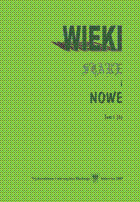Problem świadomości zagrożenia ze strony Niemiec w społeczeństwie polskim Górnego Śląska w ostatnich latach II Rzeczpospolitej
The problem of the awareness of danger on the part of Germany in the Polish society of Upper Silesia in the last years of the second Republic of Polan
Author(s): Marek MargielewiczSubject(s): History
Published by: Wydawnictwo Uniwersytetu Śląskiego
Summary/Abstract: The main Polish parties in the Silesian Voivodship, among other things, the Christian Democracy centred around Wojciech Korfanty and, after 1926, a sanation, an ideological leader of which was a voivode Michał Grażyński, despite being at variance with each other, undoubtedly shared their reluctance to Germans. It was clearly visible after Adolf Hitler’s access to power in 1933 and German expansion in Europe, the beginning of which was a remilitarization of Nadreny in 1936. Obviously, particular parties, to a different degree and in a different way, depending on the attitude to the foreign politics of the Polish government, expressed their fears of a potential conflict with the third Reis. The very fears connected with German’s occupation of Austria, Kłajpeda, and the split of Czechoslovakia increased after April 1939 after the announcement of the Polish‑German declaration from 1934 on the non‑usage of force in mutual relations. The press body of “Polska Zachodnia” sanation, took a position identical with guidelines coming from Warsaw. An exception was the attitude to the problems of German minority. In such a case, the magazine, according to the opinions of Grażyński, represented a hostile attitude to any reflections of Hitlerism, aimed at limiting German influences on the economic and social life in Upper Silesia. An attitude to the above‑mentioned issues was divergent from an official course of the Polish foreign policy. “Polonia” by Korfanty discerned danger threatening Poland on the part of Germany. It strongly criticized the foreign policy of the Polish government, however after the inclusion of Austria by the third Reiss, weakened its criticism within the scope of among other things the defence government policy. A socialistic “Gazeta Robotnicza” warned against danger threatening Poland on the part of Germany since the occupation of Nadreny in 1936. However, in the beginning, it did not support the action in favour of the National Defence Fund, strongly criticizing the foreign policy of the Polish country conducted by Józef Beck. Its support for a collection for NDF conditioned with changes in an internal and foreign politics and it was not earlier than in spring 1939, after the inclusion of Czech and Lithuanian Kłajpeda that socialists stopped criticizing the government and supported the actions of subscription in favour of The National Defence Loan and NDF. A national‑radical “Kuźnia” expressed its attitude towards Polish‑German relations by means of taking on the resolution of the second convention of the Delegates of the National‑Radical Movement which took place in Katowice on 11 June 1939. The editorial board rather did not delude themselves with the inevitability of the armed conflict with the third Reich. Thus, it postulated to strengthen the Polish element in all spheres of a social life, reduce the significance of the German minority in an economic life, join the parcelling of large German landed estate, provide the unemployed on
Journal: Wieki Stare i Nowe
- Issue Year: 6/2009
- Issue No: 1
- Page Range: 264-294
- Page Count: 31
- Language: Polish

